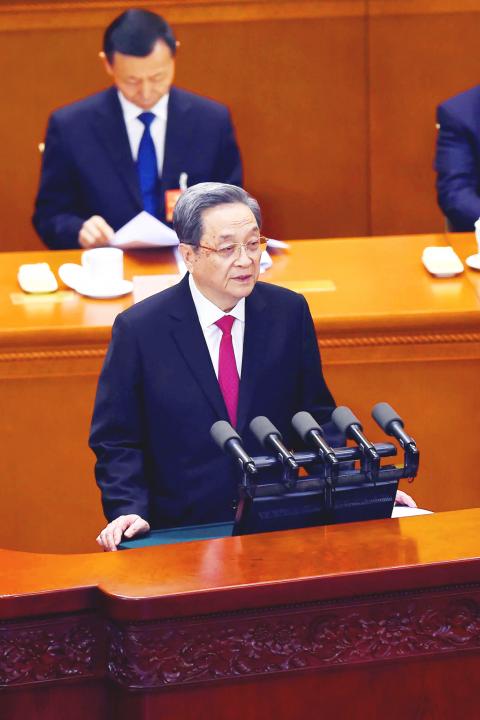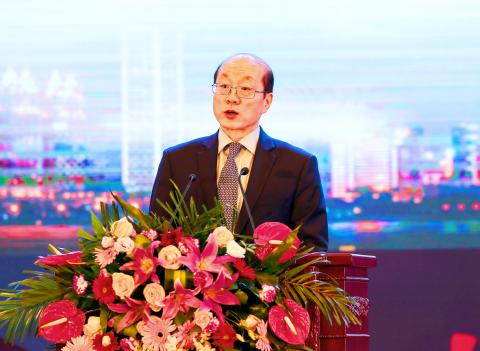Beijing is expected to further constrict Taiwan’s international space by intervening in the nation’s relations with key players in the international community, following a government restructuring that is expected to be approved by the Chinese Communist Party (CCP) at its annual meeting tomorrow.
Using “salami tactics” — a divide-and-conquer process of using threats and alliances to overcome opposition — China is expected to focus more on influencing Taiwan’s relations with key international players, such as the US, while continuing to conduct military drills near Taiwan, court its diplomatic allies and ramp up military and economic pressure on the nation, the Hong Kong-based South China Morning Post reported yesterday.
While it is unclear how the restructuring would affect China’s Taiwan Affairs Office (TAO) and other agencies responsible for Beijing’s Taiwan policy, former Chinese ambassador to the UN Liu Jieyi (劉結一) is expected to play a role, the newspaper said.

Photo: AFP
Liu is TAO deputy chairman.
The restructuring is aimed at pressuring the Democratic Progressive Party (DPP) administration into acknowledging the so-called “1992 consensus,” experts said.
The “1992 consensus,” a term former Mainland Affairs Council chairman Su Chi (蘇起) in 2006 admitted making up in 2000, refers to a tacit understanding between the Chinese Nationalist Party (KMT) and the Chinese government that both sides of the Strait acknowledge there is “one China,” with each side having its own interpretation of what “China” means.

Photo: CNA
“Beijing has made it clear that Tsai has to give a satisfactory explanation for the ‘1992 consensus,’ otherwise Beijing will not pull any punches,” the Post quoted Xiamen University Taiwan affairs professor Ji Ye as saying.
China’s poaching of Taiwan’s diplomatic allies is likely to continue, “because neither Beijing nor Taipei show any inclination toward changing their policies,” Ji said.
Meanwhile, experts said that Beijing’s increasing diplomatic and military pressure on Taiwan is likely to backfire.
Beijing could conduct more military drills around Taiwan and steal more of its diplomatic allies, but contrary to their goals, this would only further alienate Taiwanese and stir up anti-China sentiment, Center for Strategic and International Studies senior adviser for Asia Bonnie Glasser said.
At the very least, Beijing wants to “seriously undermine” President Tsai Ing-wen’s (蔡英文) administration and “torpedo” her re-election prospects in 2020, RAND Corp senior defense analyst Derek Grossman said. “I believe this effort will backfire in the long run, because the Taiwanese people will see China in an increasingly negative light.”
Meanwhile, the CCP’s fourth-ranked leader, Chinese People’s Political Consultative Conference Chairman Yu Zhengsheng (俞正聲), yesterday said that China wants to “deepen its friendship with Taiwan.”
The remarks came a day after Chinese state media said Beijing could go to war over Taiwan if a US bill promoting closer ties with Taiwan becomes law.
China has been infuriated over the bill, telling Taiwan on Friday it would get burned if it relied on foreigners, adding to the warnings from state media about the risk of war.
The legislation, which only needs the US president’s signature to become law, says it should be US policy to allow officials at all levels to travel to Taiwan to meet their counterparts, permit high-level Taiwanese officials to enter the US “under respectful conditions” and meet with US officials.
Yu put on a friendlier face at the opening session of a largely ceremonial advisory body to the legislature that he heads, making no direct mention of the bill.
“We will deepen solidarity and friendship with our compatriots in Hong Kong, Macau and Taiwan, as well as overseas Chinese,” Yu told about 2,000 delegates to the conference in Beijing.

SECURITY: As China is ‘reshaping’ Hong Kong’s population, Taiwan must raise the eligibility threshold for applications from Hong Kongers, Chiu Chui-cheng said When Hong Kong and Macau citizens apply for residency in Taiwan, it would be under a new category that includes a “national security observation period,” Mainland Affairs Council (MAC) Minister Chiu Chui-cheng (邱垂正) said yesterday. President William Lai (賴清德) on March 13 announced 17 strategies to counter China’s aggression toward Taiwan, including incorporating national security considerations into the review process for residency applications from Hong Kong and Macau citizens. The situation in Hong Kong is constantly changing, Chiu said to media yesterday on the sidelines of the Taipei Technology Run hosted by the Taipei Neihu Technology Park Development Association. With

CARROT AND STICK: While unrelenting in its military threats, China attracted nearly 40,000 Taiwanese to over 400 business events last year Nearly 40,000 Taiwanese last year joined industry events in China, such as conferences and trade fairs, supported by the Chinese government, a study showed yesterday, as Beijing ramps up a charm offensive toward Taipei alongside military pressure. China has long taken a carrot-and-stick approach to Taiwan, threatening it with the prospect of military action while reaching out to those it believes are amenable to Beijing’s point of view. Taiwanese security officials are wary of what they see as Beijing’s influence campaigns to sway public opinion after Taipei and Beijing gradually resumed travel links halted by the COVID-19 pandemic, but the scale of

A US Marine Corps regiment equipped with Naval Strike Missiles (NSM) is set to participate in the upcoming Balikatan 25 exercise in the Luzon Strait, marking the system’s first-ever deployment in the Philippines. US and Philippine officials have separately confirmed that the Navy Marine Expeditionary Ship Interdiction System (NMESIS) — the mobile launch platform for the Naval Strike Missile — would take part in the joint exercise. The missiles are being deployed to “a strategic first island chain chokepoint” in the waters between Taiwan proper and the Philippines, US-based Naval News reported. “The Luzon Strait and Bashi Channel represent a critical access

Pope Francis is be laid to rest on Saturday after lying in state for three days in St Peter’s Basilica, where the faithful are expected to flock to pay their respects to history’s first Latin American pontiff. The cardinals met yesterday in the Vatican’s synod hall to chart the next steps before a conclave begins to choose Francis’ successor, as condolences poured in from around the world. According to current norms, the conclave must begin between May 5 and 10. The cardinals set the funeral for Saturday at 10am in St Peter’s Square, to be celebrated by the dean of the College